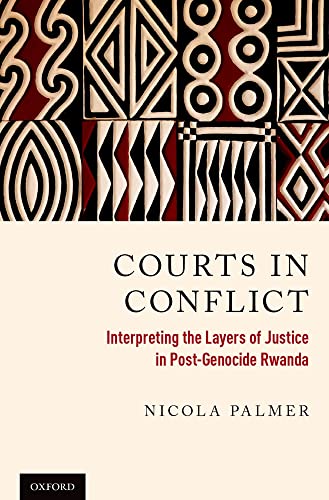Articoli correlati a Courts in Conflict: Interpreting the Layers of Justice...

Sinossi
The rise of international criminal trials has been accompanied by a call for domestic responses to extraordinary violence. Yet there is remarkably limited research on the interactions among local, national, and international transitional justice institutions. Rwanda offers an early example of multi-level courts operating in concert, through the concurrent practice of the United Nations International Criminal Tribunal for Rwanda (ICTR), the national Rwandan courts, and the gacaca community courts.
Courts in Conflict makes a crucial and timely contribution to the examination of these pluralist responses to atrocity at a juncture when holistic approaches are rapidly becoming the policy norm. Although Rwanda's post-genocide criminal courts are compatible in law, an interpretive cultural analysis shows how and why they have often conflicted in practice. The author's research is derived from 182 interviews with judges, lawyers, and a group of witnesses and suspects within all three of the post-genocide courts. This rich empirical material shows that the judges and lawyers inside each of the courts offer notably different interpretations of Rwanda's transitional justice processes, illuminating divergent legal cultures that help explain the constraints on the courts' effective cooperation and evidence gathering. The potential for similar competition between domestic and international justice processes is apparent in the current practice of the International Criminal Court (ICC). However, this competition can be mitigated through increased communication among the different sites of justice, fostering legal cultures of complementarity that can more effectively respond to the needs of affected populations.
Le informazioni nella sezione "Riassunto" possono far riferimento a edizioni diverse di questo titolo.
Informazioni sull?autore
Nicola Palmer is a lecturer in criminal law at the Dickson Poon School of Law, King's College London, and a research associate at the Centre for Criminology, University of Oxford. In addition, she serves as an advisory board member of Oxford Transitional Justice Research. Dr. Palmer received her D.Phil in law from the University of Oxford in 2011, where she studied as a Rhodes scholar. Prior to starting her doctoral studies, she worked as a legal assistant at the United Nations International Criminal Tribunal for Rwanda (ICTR), having completed her undergraduate and honours degrees in law and economics at Rhodes University, South Africa. Her broad research interests are in international criminal law, transitional justice, central African studies, and legal anthropology.
Le informazioni nella sezione "Su questo libro" possono far riferimento a edizioni diverse di questo titolo.
EUR 3,41 per la spedizione in U.S.A.
Destinazione, tempi e costiCompra nuovo
Visualizza questo articoloEUR 5,50 per la spedizione da Italia a U.S.A.
Destinazione, tempi e costiRisultati della ricerca per Courts in Conflict: Interpreting the Layers of Justice...
Courts in Conflict: Interpreting the Layers of Justice in Post-Genocide Rwanda
Da: Books From California, Simi Valley, CA, U.S.A.
hardcover. Condizione: Very Good. Codice articolo mon0003847784
Quantità: 2 disponibili
Courts in Conflict: Interpreting the Layers of Justice in Post-Genocide Rwanda (eng)
Print on DemandDa: Brook Bookstore On Demand, Napoli, NA, Italia
Condizione: new. Questo è un articolo print on demand. Codice articolo df7386724fcc279a353869642d12fcc9
Quantità: Più di 20 disponibili
Courts in Conflict : Interpreting the Layers of Justice in Post-Genocide Rwanda
Da: GreatBookPrices, Columbia, MD, U.S.A.
Condizione: New. Codice articolo 22177109-n
Quantità: Più di 20 disponibili
Courts in Conflict
Da: PBShop.store US, Wood Dale, IL, U.S.A.
HRD. Condizione: New. New Book. Shipped from UK. THIS BOOK IS PRINTED ON DEMAND. Established seller since 2000. Codice articolo L1-9780199398195
Quantità: Più di 20 disponibili
Courts in Conflict
Da: PBShop.store UK, Fairford, GLOS, Regno Unito
HRD. Condizione: New. New Book. Delivered from our UK warehouse in 4 to 14 business days. THIS BOOK IS PRINTED ON DEMAND. Established seller since 2000. Codice articolo L1-9780199398195
Quantità: Più di 20 disponibili
Courts in Conflict: Interpreting the Layers of Justice in Post-Genocide Rwanda
Da: Ria Christie Collections, Uxbridge, Regno Unito
Condizione: New. In. Codice articolo ria9780199398195_new
Quantità: Più di 20 disponibili
Courts in Conflict : Interpreting the Layers of Justice in Post-Genocide Rwanda
Da: GreatBookPricesUK, Woodford Green, Regno Unito
Condizione: New. Codice articolo 22177109-n
Quantità: Più di 20 disponibili
Courts in Conflict : Interpreting the Layers of Justice in Post-Genocide Rwanda
Da: GreatBookPrices, Columbia, MD, U.S.A.
Condizione: As New. Unread book in perfect condition. Codice articolo 22177109
Quantità: Più di 20 disponibili
Courts in Conflict : Interpreting the Layers of Justice in Post-Genocide Rwanda
Da: GreatBookPricesUK, Woodford Green, Regno Unito
Condizione: As New. Unread book in perfect condition. Codice articolo 22177109
Quantità: Più di 20 disponibili
Courts in Conflict: Interpreting the Layers of Justice in Post-Genocide Rwanda
Da: Best Price, Torrance, CA, U.S.A.
Condizione: New. SUPER FAST SHIPPING. Codice articolo 9780199398195
Quantità: 2 disponibili

